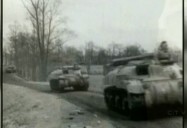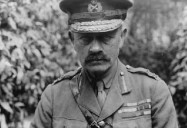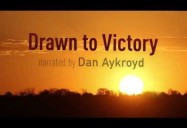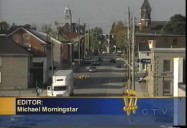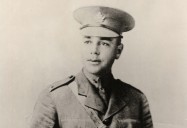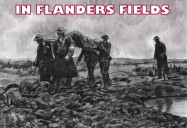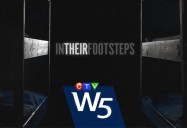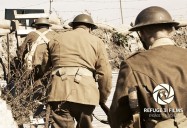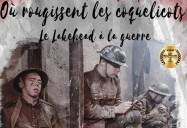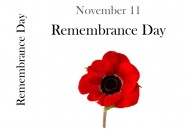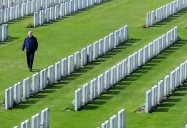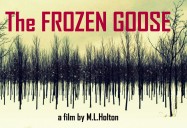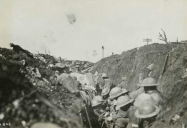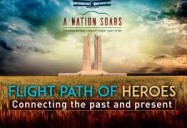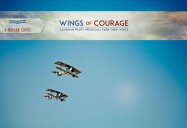
- Waterloo Catholic D S B Streaming Playlist
- WCDSB - After the Last River Playlist
- WCDSB - Remembrance Day Playlist
WCDSB - Remembrance Day Playlist
Life of a Soldier: W5
Width Height
Grade Level: 9 - 12, Post Secondary, Adult
He was part of Canada's greatest victory on the battlefield and went on to become a legend in its greatest sport. In marking the 100th anniversary of Vimy Ridge, CTV's Rick Westhead looks at the dramatic life of hockey star and soldier Mervyn 'Red' Dutton.
Dutton was educated at St. John's College in Winnipeg but left school to join Princess Patricia's Light Infantry, enlisting in 1915. In April 1917, he took a shrapnel blast to the right leg that was so bad that doctors considered amputation. They delayed, and he recovered full use of his leg. Dutton went on to play professional hockey and was inducted into the Hockey Hall of Fame in 1958.
|
Running Time: 9:00 Country of Origin: Canada Captions: |
Producer: CTV Copyright Date: 2017 Language: English |
Video Chapters
-
Life of a Soldier: W5 20:00
He was part of Canada's greatest victory on the battlefield and...
TRANSCRIPT
Close- Welcome back. Well, on a week when the horrific Syrian Civil War is once again top of mind, we're reminded of the incredible heroism of everyday Syrians who have had no choice but to flee the devastation. Tens of thousands of them are now integrating into Canadian life, but one has been truly exceptional. Hani al-Moliya is already having a huge impact in his new home country, in spite of a disability which might have limited his success.
- It's another busy Wednesday night in the heart of Toronto, and tens of thousands are heading into one of Canada's biggest indoor stages, where hockey usually rules, to hear the story of a young man new to the country and all he hopes to achieve. Hani al-Moliya is a tentative figure backstage. An eye condition from birth means he cannot walk easily without assistance. He can see some things up close, but in a very narrow band. He's waiting his turn alongside some of Canada's most recognizable icons.
- Everybody jump. Jump!
- Already energizing a crowd of youth and their families around the empowerment messages of WE Day.
- What's going on, WE Day?
- The founders, the Kielburger brothers, are the hosts.
- We're so excited to be back here in our hometown of Toronto with all of you.
- Tragically hip lead singer Gord Downie is here.
- And then I jumped to the left.
- The man in motion, Rick Hansen.
- Good evening, WE Family. How you doing tonight?
- And Prime Minister Justin Trudeau's mother, Margaret.
- What an honor to be here with all of you.
- And then the name few know, but with a compelling tale of survival against big odds.
- Please join me in giving a warm WE welcome to Hani al-Moliya.
- [CHEERING]
- Woo!
- Were you afraid at all when you stepped on that stage? Because that's a big crowd.
- Oh, yes. You're not alone. You are [? physically ?] at the center, and you're connected to all of these people. You could feel the energy. And once you open the door and tell them-- we just give them the feeling that you are here for something. And they're going to give you the energy they want, and from that moment you just do it.
- When I think about the way my life used to be, I remember the suite where my family would gather, laughing and talking with neighbors. But then the Civil Syrian War came and everything changed. We became prisoners in our homes.
- Hani was the first of his family to flee to the refugee camp in Lebanon in 2012, but he's never explained why he left Syria so suddenly. During those two years, the family had no way of knowing where their future would take them. Hani perfected his English, studied photography, and tried to capture life for people with nowhere to call home.
- How are you?
- Eventually, his family found one.
- Good to see you.
- It was last winter when W5 first visited them in Regina, helping reunite them with the UN-sponsored photographer they'd grown close to in the camp. I also shared some footage that Russian television had mistakenly allowed to be posted to YouTube of the family's old neighborhood in Syria. A day later, Russia made sure no one saw these harsh images ever again.
- That was close to our hometown, actually, is here.
- Does that even seem possible to you?
- Oh, that, I couldn't imagine that.
- But now, on this night, his whole family is safe with him in Toronto. Hani is finally ready to share the ordeal that led him to flee home so suddenly. His family was desperate for food, so he and his cousin tried to smuggle some in.
- My family-- we were running out of food. And when my cousin and I smuggled food into my neighborhood and house, we were thrown in jail.
- I didn't know that about your story.
- Because I couldn't really share it with people.
- Really? Why?
- Well, just because--
- You're worried about your family.
- Yeah, worried about political reasons. I mourn that time, because I could have been killed. And it was so easy to just-- my life at that time was worth a bullet. It was ridiculous.
- Your family is running low on food.
- I said, well, let's go and do it. Well, at the checkpoints, they were not happy with that, and they said stop. So they took us to an intelligence offices and started to tell us, what are you doing, who are you supporting with that food. That's for my family. You can go and make sure.
- Did they harm you? Yeah, it has some kicking and trying to boot that fear inside so you can say whatever you want.
- How long were you in the office being interrogated?
- It was like four hours. When my mother saw some signs, I tried to cover them from the [INAUDIBLE] and everything. She saw the signs, and when I took my shirt, she saw some signs on my body. He said, well, mama, this kid is not going to be here no longer. Send him to any safe place, because that's not what we wanted to do for him.
- Hani's parents, appalled at the bruises and cuts all over his body, asked an uncle to smuggle him to Lebanon the very next day, because in Syria, if the army doesn't capture or kill you, you don't stick around.
- You were the very few that were ever released?
- Yes.
- From army custody in that town?
- Mm, hm. They don't really care about numbers. They're just people without emotions, and they were trained to do this kind of stuff. So for them, it's like drinking coffee.
- Knowing more about Hani's past-- the enormous loss and terrible abuse-- helps explain the incredible fervor he has tackled life with since coming to Canada. Not too long after arriving, he honed his photographic skills, capturing frames of his new life in Saskatchewan, and he's now making enough money that he has stopped accepting the financial help new refugees are offered for a year. He's honed his English skills, adapted his math to North American standards, worked hard enough, and impressed enough people to be offered a full scholarship at Toronto's Ryerson University in 2017.
- So once upon a time, Hani, I used to be a teacher here. And if you go here in the wintertime, this is one great big skating rink.
- Oh, wow. I can imagine that.
- So the residence is just a couple of blocks down here, which isn't too far from the student center where we've been.
- OK, cool. And this is safe street here?
- Yeah, this is all pedestrian, so makes it a lot easier-- no cars. As we walk his new home, he tells me he wants to create a virtual reality experience of being in a refugee camp while studying computer engineering on campus. What value will that film have to people who have not been in camps?
- Well, they're just going to put up [? glasses ?] and they will be in a tent. That's how it is. I try to convince people how it looks like, even though I couldn't imagine how that's-- now if you told me go back it's going to be like, oh. I can't imagine myself in a camp, and I couldn't before.
- So I understand how people wouldn't. It's going to be virtual reality. Go and see it. And from your home here in Canada, you're going to feel the experience.
- A big city is a big step for someone with impaired sight and someone who has lived in tight quarters for three years now.
- You've never left home?
- Yeah, that's the thing. It's just a new experience, and it's going to have, like-- it's not just the regular students who is moving. I have a lot of struggles to deal with. It's going to be fine.
- How is your eyesight doing, by the way?
- For me, the side effect is the headache. When I focus for after 30 minutes, it's going to be like a headache, and I can't really take any medicine because I'll be addicted to it. So I understand that I need to deal with it.
- So is that part of why you feel such a sense of urgency in your life?
- I don't have a lot of options in my life.
- Ugly.
- Oog-ly.
- Ugly.
- Ugly. Oh, ha, ha.
- When we first met Hani's family in Regina, they had faced delays in accessing language training and other resources.
- What color is silver?
- And Hani went so far as to suggest Canada had accepted too many Syrian refugees too quickly.
- So you're saying they're coming too fast?
- Yes, and there are too many in any city. There are too many Syrians. And these people are working hard, but this is not enough to help them.
- Well, in October, Hani brought those concerns directly to the Prime Minister's office as one of Justin Trudeau's first appointed youth ambassadors. The position gives him the power to offer advice and a direct line to the bureaucrats handling refugee issues, while allowing him to travel to meet other young Canadians as well.
- There I can draw on my own experiences and share my ideas to improve the life for everyone here in Canada, because I am so proud to be a Canadian. And now, let me introduce you to my family.
- Before I go, I just want to leave you with something here. Guys, please don't wait until tomorrow to make a difference in your life. Start tonight, WE family. Thank you.
- So much has happened. Are you worried that you're sort of becoming this superstar immigrant, that you're being in some ways labeled and used by others because you're so articulate and because your message is so powerful?
- When I find myself that, I call it home. Now, I don't really see myself also as someone who just came. No, I feel like I born here. I feel like a lot I'm trying to just catch on, to try to build that network in the country. And also for me to give back to Canada, it's really important. It's a bit overwhelming, but it's worth. It pays off.
- Well, the speech was an exhilarating experience for Hani and his family, who've only really seen Regina since arriving in Canada. Toronto was a little overwhelming for them.
- We vote for him.
- We vote for him.
- The al-Moliya family has relied on Hani heavily and his abilities in English. His dad still hasn't found full-time work, but everyone else's English is improving.
- Hani is doing so good, everything. He talks so good.
- But now they're going to have to cope without him as he begins university. Their cultural bridge is moving on. Hani feels the pull of destiny. He's a young man in a hurry, and you likely haven't heard the last from him.
- Well, Hani is now close to writing his first semester exams at Ryerson University and hopes to spend the summer in Montreal working as a photographer. There's more W5 straight ahead.
- Determined to fight for his country.
- He lied about his age to allow him to serve.
- In a dark and horrible war.
- This is a period of great death and destruction.
- When W5 continues.
- Welcome back. Red Dutton was among those we just honored at the 100th anniversary of the First World War battle at Vimy Ridge. The injuries he sustained there eventually led him to an illustrious career in professional hockey, but as TSN's [INAUDIBLE] explains, Dutton would know more loss and heartache as later wars took from him life's most precious gift.
- I think it's quite remarkable how we could go on to play hockey, having had his leg torn apart. That tells us something of the resilience and the grit of both Red Dutton, but also the generation of these guys.
- In 1914, Mervyn Dutton was captain of the hockey team at St. John's school in Winnipeg. His nickname was Red because of his copper-colored hair. Dutton was 17 years old and was about to join a very different team, battling for a very different cause.
- The First World War is really Canada's coming of age.
- Tim Cook is an author and historian with the Canadian War Museum.
- Thousands of under-age soldiers went to the armories, went to the recruiting sergeants, and really presented themselves there.
- Red signed up in May 1915, two months before he turned 18, the minimum age to enlist.
- It's pretty clear he lied about his age, and you can see that on the attestation paper. It has a place on the date, and you can see that he's clearly scratched it out and put an earlier date to allow him to serve.
- How typical or how atypical would this have been?
- I think it's quite typical. They looked at his enlistment and said, you're too young, and he probably just said, OK, scratched it out, and said, I'm OK to go now.
- [ARTILLERY FIRE]
- In April 1917 Dutton was serving with the Princess Patricia's Canadian Light Infantry at Vimy Ridge.
- Vimy Ridge is in Northeastern France. It's a commanding ridge. It's seven kilometers long. The Germans had captured it in October of 1914, and they had really fortified it for about 2 and 1/2 years. These young Canadians-- they know they're facing this fortress. They know it has been a death trap.
- On the morning of Monday, April 9, 1917, four Canadian divisions attacked the German lines. Awaiting them was fierce hand-to-hand combat.
- Young guys are killing young guys. They're driving bayonets. They're shooting men. This is a period of great death and destruction and of tremendous carnage.
- By the end of the day, the Canadians had taken the ridge. They paused to rest and regroup and celebrate their victory. Then they went in pursuit of the retreating Germans, who were still putting up a fight.
- And Red Dutton catches a piece of shrapnel. And I imagine Red Dutton's leg was quite literally torn open. And it's possible that a surgeon would have looked at that and said that he had to amputate.
- What happened next is the stuff of legend. Dutton is said to have told a surgeon that he was a hockey player, so there'd be no amputation.
- I can certainly understand how a young guy who is obviously a sportsman-- the first thing he's going to think about is, don't take my leg.
- He was a competitor. He liked to win.
- Richard MacDonald is Red Dutton's nephew.
- How much do you know about his war experiences?
- I knew that he had been in the war. But mom said it was a touchy subject and that he needed to not mention the war around Uncle Murph.
- Dutton was discharged from the Army in 1919, with pieces of shrapnel still in his leg. He returned home to Winnipeg with a plan.
- He thought that the best way to recover and to develop a strong body again was to play a lot of hockey, so he joined seven or eight leagues in Winnipeg and played virtually hour upon hour every day.
- Hockey historian Andrew [INAUDIBLE] says Winnipeg was a hotbed of hockey, which was exactly what Dutton needed.
- He played a lot of really good, competitive, serious hockey, recovered from his wounds, and developed into a world-class player.
- Dutton's story became so well-known, it was even dramatized in a comic strip-- his determination to come all the way to the NHL, first with the Montreal Maroons and then the New York Americans.
- Dutton was 6 feet, 190, something like that, so he was a very large man in an era when 5'7, 5'8, 5'9 was the norm. He got into a lot of fights, drew a lot of penalty minutes, but he was a very effective defenseman in his era.
- After his playing days ended, Dutton became coach and manager of the Americans. His colorful style made him a favorite of New York sportswriters. Then came the Second World War.
- By 1942, we're in the middle of the war, players are leaving all the time to join the war efforts. So they simply disbanded the team in 1942.
- A year later, NHL President Frank Calder died suddenly. Dutton agreed to take over on an interim basis. It's remarkable that Dutton could focus on his new duties. Two of his sons, 23-year-old Joseph and 20-year-old Thomas, had enlisted in the RCAF and were flying missions over Europe. In July 1942, a letter arrived from the RCAF. Joseph was missing in action. Eight months later, a second letter. Thomas was now missing.
- The missing was a terrible category to be in. These living boys who had flown off had just simply disappeared.
- From his NHL office, Dutton sent letter after letter to the RCAF, seeking word on his sons. After long months of hoping against hope, Dutton received the news he had been dreading. Both boys were gone.
- I can't imagine what that was like. It must have been horrific. This monument in Surrey, England, is dedicated to Air Force personnel who lost their lives during the Second World War and who have no known graves. Among the more than 20,000 names engraved on these walls are those of Red's two lost sons.
- I think it was a pretty deep wound for him. And certainly as a father losing his kids, he just did not-- I don't think a lot of people in the day talked about those things.
- After the war, Dutton left the NHL and started a construction business in Calgary, completing such iconic structures as McMahon Stadium. Another, more personal project brought him back to the Winnipeg school he'd left to go to war. Here, he built the Dutton's memorial arena in honor of his sons. Because Dutton was a strong supporter of Canada's National Hockey program, the ice surface has international dimensions.
- He was a proud Canadian. He was a patriot. What he wanted was a place where Canada's national team could train.
- In October 1980, Dutton dropped the puck at the first ever home game for the Calgary Flames. Not long before his death, the city held a special tribute to the now frail hockey legend.
- It was as a player that he was enshrined in the Hockey Hall of Fame.
- [CHEERING]
- Red Dutton died in Calgary in 1987. He is buried here, at the top of a high ridge overlooking the city. 100 years ago, he and thousands of young Canadian soldiers like him stood atop a far distant ridge where their courage and sacrifice made history for their nation. Red Dutton is someone who was shaped by war, and though he is best remembered as a hockey player and a hockey builder, he was also a soldier and a grieving father.
TRANSCRIPTS:
Interactive Transcript
Transcript (PDF)
